Have One On Me
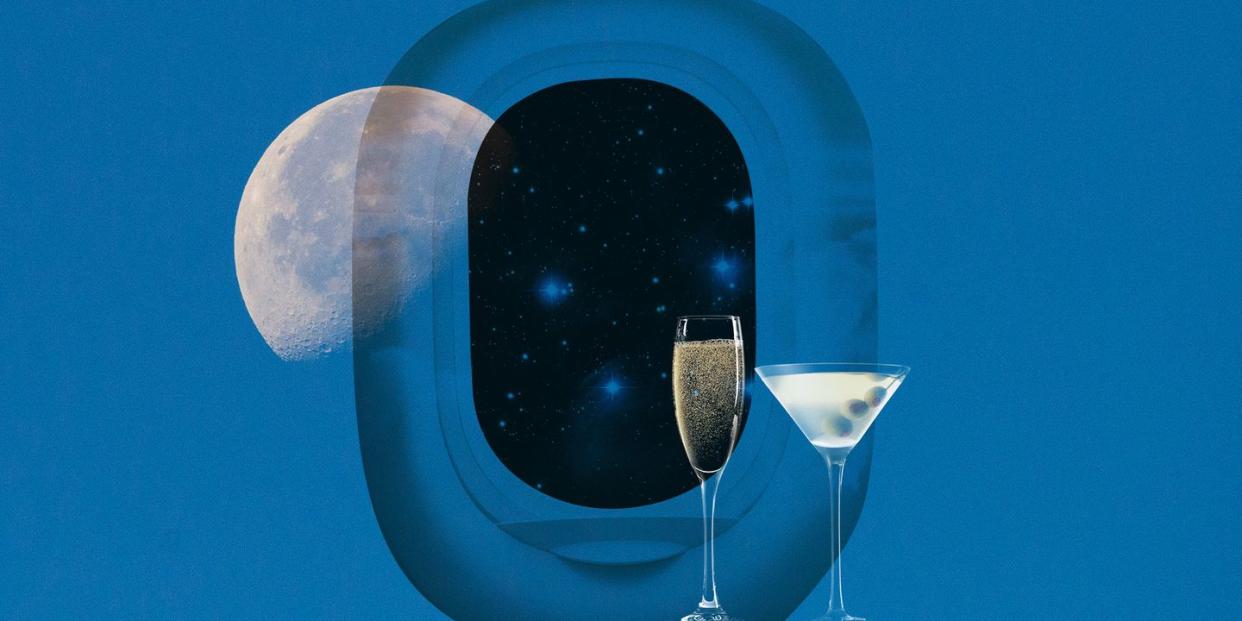
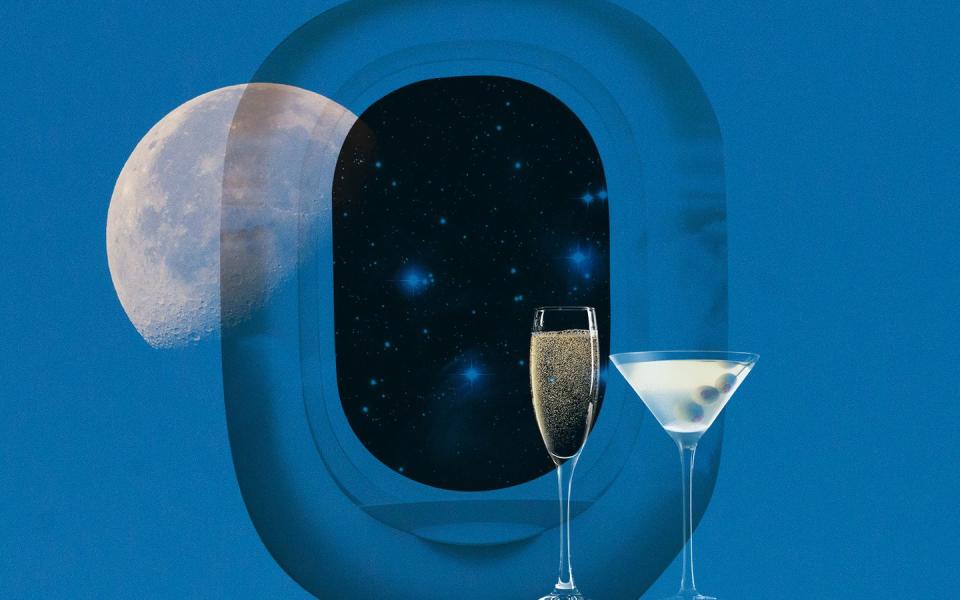
What if I told you that, many years ago, I flew to Minneapolis to see a woman widely considered—or considered by me, anyway—one of the greatest writers in this country? At that point, I hadn’t been to Minneapolis in years, though I had once spent a fair amount of time in that city, though not out and about: I was mostly either in an office or a hotel room, always the same office and always the same hotel, too, and often but not always the same room, even, so I might confuse myself, on a visit, and go to the room on the second floor where I’d stayed some previous week instead of the room on the fifth floor where I was staying that week. The rooms were all similar, but not identical. The hallways were very dark.
That trip, the weather was unseasonably warm, and I took a taxi to the museum because despite having spent so much time in that city those years earlier, I had never once been to that museum. It was said to possess renegade spirit; of course, museums in provincial towns are often insistently avant-garde, having something to prove.
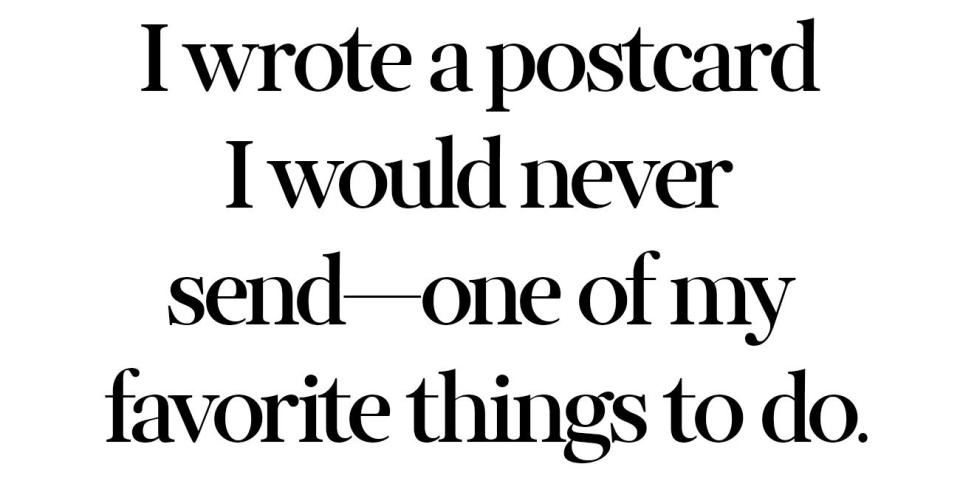
I walked around for an hour. One temporary exhibition was quite awful: earnest and undisciplined photography. The other exhibition was due to open that weekend and still being installed, so I toured the permanent collection for an hour, then had a cappuccino and sparkling water in the café. I wrote a postcard I would never send—one of my favorite things to do—and took a taxi back to the hotel. The air conditioning was very powerful. I ordered room service and read for a while, then was awoken at four by the blare of a truck in reverse, the clatter of glass upon glass. I opened the blinds and saw a recycling truck, going about its business.
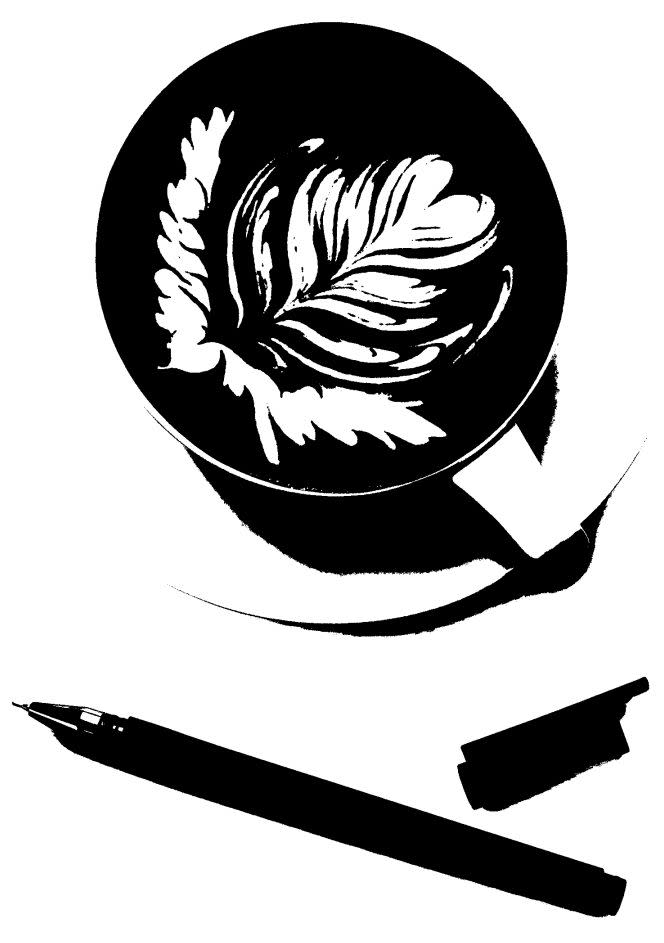
I could not fall back asleep, less because of the noise than my own nerves. I pretended to doze, thinking I might trick myself. I masturbated, orgasm the only sleep aid I’m aware of, then I gave up and switched on the light. I put on the clothes I’d worn the day before, the ones I’d worn on the plane, and took the elevator to the lobby, which was grand but empty, the desk manned by a young man with a beard (the young men all seemed to wear beards, then) and dark hair. The door to the street was locked, and he had to buzz me out. I went out into that hour that is neither night nor morning, and stood on the street, unsure what to do next.
In modern cities, you never know where you can walk, because they’re designed for cars instead of people. I crossed a footbridge, then three lonely intersections, and there were neither cars nor people. I stood in front of a church, handsome enough but not one of those awe-inspiring ones, the architect touched by God himself, and I smoked a cigarette, something I was trying to do less of, though still did often enough that at some point a year or two earlier, Philip had given me an antique lighter, from Asprey, found at a stall selling mostly junk in Buenos Aires.
We weren’t in the habit of exchanging presents for the usual reasons. Giving a birthday gift seemed juvenile and caring about an anniversary seemed more bourgeois than we were willing to be, and anyway, what did we want or need but not buy ourselves? We didn’t tally the money we’d take turns spending on meals or tickets to museums or movies, though certainly Philip paid more often than me, as he made so much more money. That we were unsentimental about them made what gifts we gave one another more meaningful, I suppose, though the Asprey lighter was also a thing of beauty, thin and elegant in a way that recalled the Duke of Windsor or someone like that. I mention it because that moment, that cigarette, at four in the morning on the very quiet streets of downtown Minneapolis, the traffic signals blinking a useless yellow, a warning with no one to heed it, was the last time I remember using that Asprey lighter. I must have lost it on that walk, or left it behind in the hotel when I checked out, though I did call a couple of days later when I realized it had gone missing and was told it had not been found there.
I walked to a convenience store, open all night—orange Formica countertops, self-service with room temperature creamer and Styrofoam cups—and bought a coffee and a banana muffin wrapped in cellophane, though I was sure it would taste chemical and strange. I went back to the hotel, and the man at the desk buzzed me into the lobby, I took the elevator back to my room, and took off my clothes, which I felt smelled faintly of the airplane, and sat on the bed naked and ate my muffin and drank my coffee and watched the television news. I showered, ordered another coffee from room service, and checked out of the hotel.
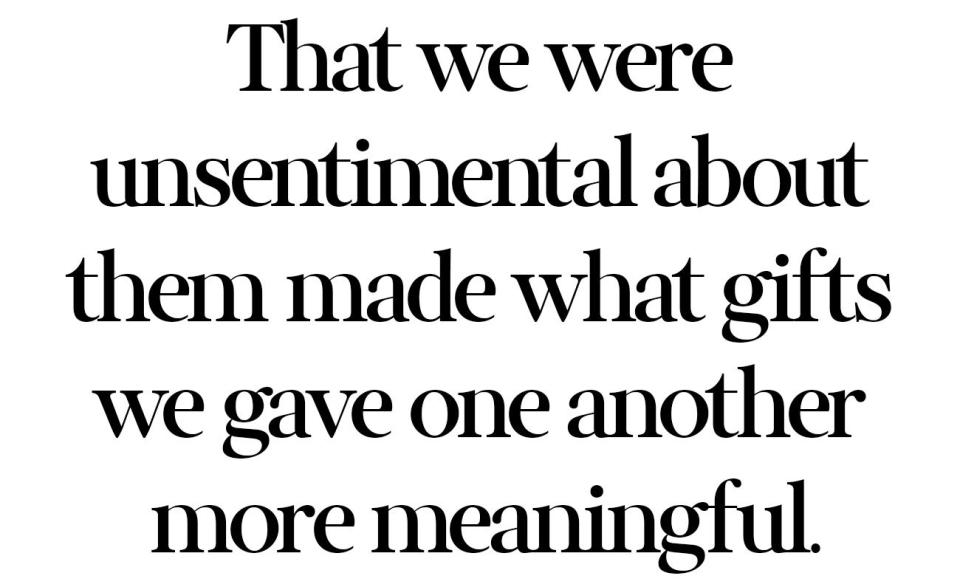
I took a cab to meet the writer, not at her home, which I understood she was quite private about, but at a restaurant, an unassuming place next to a dental office and across the street from a bank, a little island of commerce in an otherwise residential neighborhood of gracious houses arrayed around a lake.
I arrived early, but she arrived early, and seemed displeased that I had, too, as though we’d both made a similar calculation about arriving early and what that did to establish a power dynamic for the conversation we were meant to have. She was very beautiful, indeed, was known for this, to some extent, though in her thirties it had seemed suspicious, some implication that she was not the writer she seemed to be but successful by virtue of her youth and beauty. I thought her more beautiful, now, no longer young. She was not airy and light as older women who had been beautiful decades before can seem. She was matter of fact.
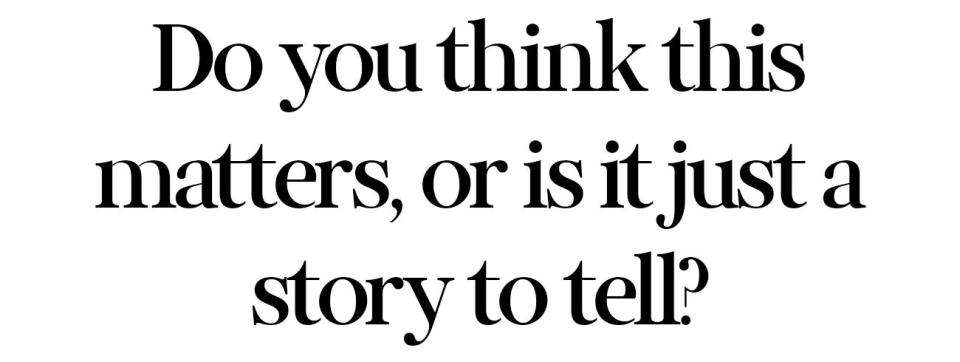
She was practiced at conversation, having for so long been the kind of famous that made people want to interview you, but I have always been adept at talking to women older than me. We spoke for longer than had been arranged by her press representative, a serious woman named Jane, and I wanted to acknowledge this, in case she had some place to be, but was fearful this would remind her that our conversation was a professional one, on the record. I didn’t want her to think she’d made a mistake, been too unguarded.
I had a little recorder on the table, and kept fiddling with it because I was so nervous that it was not working, not capturing every word. She looked at me, but also past me; she was interested in me, but only because she was polite.
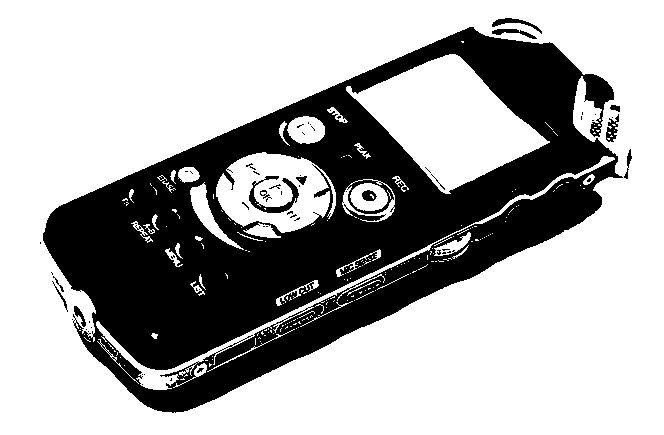
“Years ago, when my children were small,” she said. “My husband would go away, for one night, for two, and I would be alone, in this house, in the snow, I always remember it being snowy, which can’t be the case, but I would worry, what if—what if I stepped outside to admire the moon, slipped on some ice on the porch, fell and broke my neck? What if I had an aneurysm in the shower, fell and hit my head, died there, with the water running, with my children asleep in the next room? No one but my husband knew that I was I was there, alone, and of course, he was far away, so no one would come to check on us in the morning. I made a pact with my sister, that she should call me, every morning when my husband was away, at six in the morning, to verify that I was still alive. What If I wake you? she asked. But I told her that the children would of course have woken me, if I were still alive, and even if they were still asleep and the telephone woke them, the irritation I might feel would be outweighed by the comfort of knowing that someone in the world would know whether something had gone awry, if I did not answer the telephone. I needed someone to know, someone to care. This was like prayer, I think, only more practical. This was what I could do. You have a baby, you realize how fragile this all is, that it can be undone with an icy step, a blood clot, a fall. Do you think this was odd of me? Or wrong of me? Do you think this matters, or is it just a story to tell?” She looked at me through her glasses, so unflattering they felt like an assertion that she was done with vanity.
My coffee had gone cold. “It sounds very logical.”
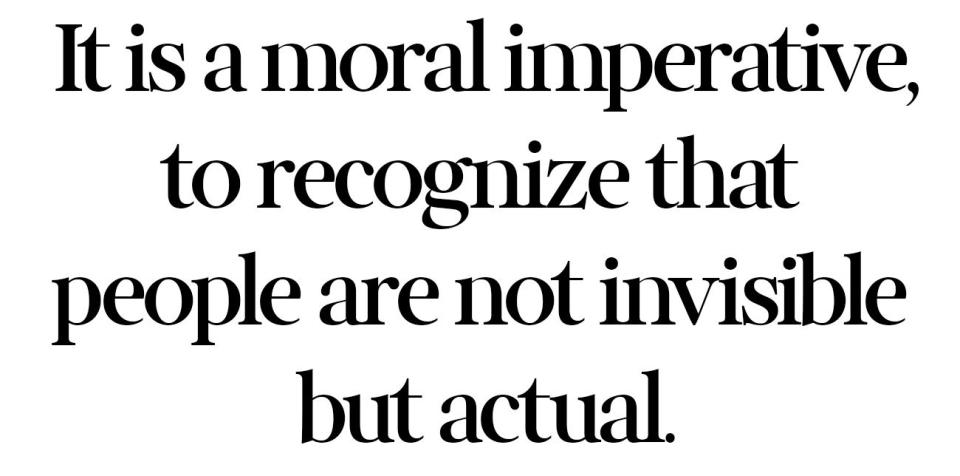
We were quiet a moment, then made some small talk, mutually agreeing that our morning had come to its end, and she shook my hand warmly and left the restaurant. I paid the bill.
I had ample time before my flight, but I took a taxi to the airport anyway, having already seen the museum, and because I wanted to try to get on an earlier flight, knowing, from my many years commuting to Minneapolis that there were several flights daily back to the coast. But I was feeling leisurely, or companionable, or maybe just caffeinated, after my morning with that writer, who I now felt I had confirmed was a genius, one greater perhaps than was even then, late into her career, well understood. I was excited about our interview, abuzz with the transitive magic of her brilliance. I checked the recorder twice to be sure it had captured our conversation.
“You’re from Minneapolis?” The driver met my eyes in the mirror, that neat little trick.
“Just here on business.”
“You had a nice stay?”
“It’s a beautiful city.” Though I am not friendly, I like to talk to taxi drivers, waiters, the women who you always see in hotel corridors, wielding vacuums or pushing those huge trolleys loaded with toilet paper and cleaning supplies. It is a moral imperative, to recognize that people are not invisible but actual, plus you often learn interesting things. I don’t even think of myself as someone who takes taxis frequently, and I have met drivers from Turkmenistan, Kenya, Ghana, Egypt, Bangladesh, Ivory Coast, the Republic of Georgia. That driver from Georgia had been delighted to hear I’d once visited the place, and could make small talk about their staple cuisine, about Georgian wine, about a certain pop singer who was in heavy rotation on the airwaves of Tbilisi the year I’d been there. It was a nice moment of communion. Perhaps that’s what I want out of chat with such people or any people: the alleviation of a loneliness that is my own, not theirs.

“Very beautiful day.” The driver nodded as though he’d personally arranged it, and for my benefit alone.
We talked about his young daughters, of whom he was naturally very proud. He told me he was going to school to study physical therapy but made quite a good living driving a taxi, and the hours suited his class schedule. So he was not unhappy. I asked what his wife did, and he pointed out that it was a man’s responsibility to work and a woman’s to raise the children, mind the home, cook, that sort of thing.
“What does she do, when your girls are in school, though?” My own days were rarely so full, sleeping until 7, walking, reading, trying to make appointments, the various ways people like me while away our lives.
“It’s not right. Your wife works? You have children?”
I told him that I was gay, a little leap of faith, always, but he was a young man, modern enough, I presumed from his dress, his command of English, and well inclined toward me, I thought, because I had asked whether he was teaching his daughters Amharic.
“Too bad,” he said, and was quiet for a time.
Was it so bad? I rarely thought of that. It would be like lamenting using your right hand instead of your left. I looked out of the window. The approach to airports looks the same in basically every place in this country.

“Let me ask you about this.” The man hesitated. He was very symmetrical, so that even though I only saw him in reverse, as the mirror showed him to me; he was like one of those people you saw in frescoes from Pompeii. “Do you not think it is against God?”
I didn’t (and still don’t) know about God, and I told him that. When we reached the terminal, I could see something in the way that this young man looked at me as he helped me with my bag, though it was small and I didn’t need help, something like need, something like desire, all muddled up with disgust. All very familiar, the sense that a man might want either to see what it’s like to have his penis in your mouth or to punch you for making him imagine it. I bought another coffee and was able to board a flight leaving an hour earlier than the one I was scheduled to take, though it was still dark as the plane descended, the city’s lights miraculous.
I’ve forgotten the most important part of the story, which was that as we landed, I was listening on my headphones to the device I used to record my conversation with the writer. I was surprised at how persistent the ambient sound of the restaurant was: porcelain on porcelain, the scrape of metal on a bowl, genial chatter, even music, though I had been unaware that there had been music playing.
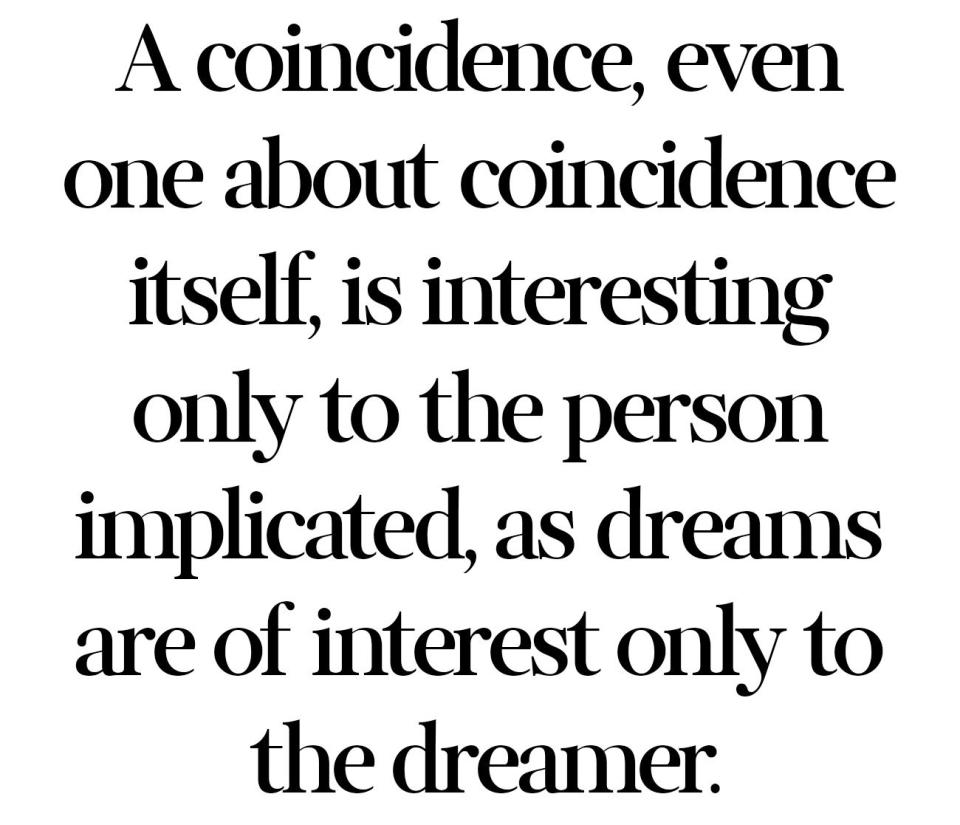
“The thing I’m struck by, as I get older, but also, too, when I was young, was the importance of pattern, which we call coincidence because we don’t know what else to call it. Or we call it the divine, because it’s outside our ability to comprehend it unless we label it incomprehensible. But there is pattern, there is math, it’s all like that, all of life. Isn’t that what music is? Math? Have you ever listened to Bach? It’s just math, but it’s also so close to God it’s actually.” She stopped, did not trail off, but stopped. I murmured something the recorder did not capture. “It’s what I’ve been trying to do, in all the novels, something I have probably never done well.” She sounded sad.
I removed my headphones and went to the bathroom, then sat back down in my seat and rummaged through my notebook and found a brochure from the museum I had visited the day before. I read, for the first time, the description of the exhibition I had been unable to attend because it had not yet opened, and saw that it was a solo show, the first museum survey, of a woman who I had once known very well, indeed, who had been one of my dearest friends, many years earlier, when we were both very young and with whom I had lost touch, as happens, and who was, it seemed, now a very highly regarded sculptor about to have her first museum survey at this institution in Minneapolis, Minnesota. Still, a coincidence, even one about coincidence itself, is interesting only to the person implicated, as dreams are of interest only to the dreamer.
Phillip was an anesthesiologist. We had met over a weekend at the country home of the richest woman I have ever known, though the home was a modest affair where the heat was never turned on and the rooms smelled of animals. She had two dogs and two cats, in whom I had to feign interest because that’s what good guests do; they were fancifully named, though I can no longer remember their names.
Phillip had been in college with this woman; she was not matchmaking, and in truth he and I spoke very little that weekend, but months later, we ran into one another at a party being thrown to raise money (lighten up your pockets!) for a memorial to those lost to AIDS, at a preposterously beautiful home. In truth, I had made the required donation less because I was interested in memorializing those lost to AIDS than I was in seeing this home, which was astonishingly large and right in the center of the city. There was a J.M.W. Turner in the sitting room off the master bedroom. Imagine owning a painting by J.M.W. Turner and deeming it suitable only for such a useless little room.

We were both relieved to see one another, a familiar enough face, in that strange home, and Philip and I went to a bar at a hotel down the street and I drank a whiskey and he, charmingly, a glass of champagne, and we talked about the house we’d just been in. Philip said there was a Balthus, too, and I rued that I hadn’t seen it. Then, as though it had been arranged, we went to his apartment, which was not so far that we could not walk, and had sex, and then I dressed and left, and then the next day we had dinner, and so nine years on we lived together in a little place that I loved, where we paid a lot of money to have shelves built in, where there was no washer and dryer (we dropped off with the Chinese man who ran the laundry two blocks West) but enough space for the two of us, our small lives.
Philip worked at the hospital across the street from the memorial which those wealthy, well-meaning men had erected to those lost to AIDS. I worked a little at our small home. I did nothing much in particular, it was a life, though, and then one night I awoke in a panic, some part of me sensing what was already true, that Phillip had died in the night, his heart had simply ceased to work, and the life I led got a little smaller.
We all know death is the only certainty, yet imagine otherwise to make our days tolerable. Perhaps the life we had seems small in retrospect only because it ran its course, it gave way so easily, undone in one night, a cardiac event and that’s that. It’s possible that what I remember as mere happiness was actually near joy. Pleasure, like pain, can’t be remembered with any fidelity. And it’s an accomplishment, to make a life with someone, to pay a lot of money to have bookshelves built in and file your books away together, to make the same spaghetti sauce you always make, or listen to Dvorak on Sunday afternoons, or have a couple of people over for Thanksgiving, or plan vacations to warmer countries, or be unable to recall which socks are whose. Yes, that all goes away, will all go away, someday, for each of us. We know it, but we do it anyway—we live.

I gave away Phillip’s clothes. His sister came from Boston and took some of his books. We didn’t have a wedding band, nothing like that, but he had a ring that he had worn for a time, that was special to him in some way, and I carried this out of the house and threw it into the river. I was setting the man free. I sold the little apartment with the built-in bookshelves that I so loved, and went away for a few weeks, to London, then to Italy, then I came back and bought another, smaller apartment far from the one where Philip and I had lived, a different neighborhood, louder and more gray, one far from the hospital where he had worked which, anyway, had closed (mismanagement), the building transformed into luxury condominiums.
I did not do much. I walked, I read, I tried to do improving things like going to hear the philharmonic, but my attention often wandered, not to Philip, which my friends no doubt thought or worried. He was gone, that’s how death works. I was, I can see now, from the distance of these years, deranged with clarity, like those madmen who believe they’ve communed with God and know: the end is coming! The rest of us can’t admit that those madmen are right: the end is coming. My friends’ attempts to comfort me were kind but it was not comfort I needed, but distraction. I was not deluded with grief; the rest of the world was deluded without it.
This persisted for years, and really persists still, because even now I feel this way, not just my lingering affection for Philip, dead before forty, so kind and lovely a person, so handsome with his scratchy beard (the young me all seemed to wear beards, then), his lovely blue eyes, his reassuring body, his instinct toward fairness, his interest in things that did not interest me, like tennis or astronomy or local politics, but this awful feeling I cannot shake that I know something that no one else does, though cannot talk about it because this is the defining characteristic of the mad. But my life did go on, does go on. That’s what friends, family, strangers say: life must go on. They’re right.

Anyway, what if I told you, then, that I was flying to Texas, recently—well more recently, this was a few years ago now—for a book festival, one of those things, a celebration of high culture, and I was seated on the plane next to a young poet, really quite a lot younger than me, who, upon noticing the book I was reading, made small talk, shook my hand, recognized my name, perhaps, or maybe didn’t and only implied that he did to be polite or charming, and his hand was so soft, so dear, so small. It was another of those moments, I suppose, where you understand what such a moment is prelude to.
The poet was staying with friends of his, because he was too young, too poor, frankly, to do otherwise, but I was being put up at a quite nice hotel, which is something that has happened to me more often as I get older, and I invited him to meet me there for a drink that night, and we sat in the elegant bar, with its sterling bowls of mixed nuts, and we talked, for some reason, about the Beatles, and I was tickled, then tantalized by his ignorance of the Beatles, a measure of his youth that made him more appealing than he already was, with his blonde hair, his little hands, his girlish voice, his fashionable clothes that struck me as so odd and self-conscious because I was old. I am older now; I can’t imagine how the man would look to me now, how either of us would look to me now, if I could see the two of us now as we were then: a man at middle age in an Italian linen blazer, a poet in his twenties in strange white pants. I drank vodka with a lemon in it and he drank a martini, and holding the too-large glass—I have always hated martini glasses—he was as pretty as the heroine in an old film.

I had spent three years masturbating myself to sleep in what no doubt seemed to outsiders like lingering fidelity to Philip but was simply the conviction that sex would not transport me, that what I needed was some sleep and some quiet, the occasional job writing this or that, the occasional trip to some other city, to be a weekend guest of people richer than me, who had homes and more well-defined lives, with children and pets and luxury cars, that I did not mind being alone. Philip was dead, but the world was still not so bad. I was alive, maybe more alive than I had realized before meeting this poet by chance on an airplane. We went upstairs to my room, which was almost desperately grand, eager to distract from its status as an interstitial space, fitted out with a fireplace, too many throw pillows, useless ceramic vases. I undressed him slowly. His body had not yet changed, the way men’s bodies do at a certain point, widen, harden in some places and soften in others, evolve. That was how young he was. He smelled sweet, of soap, he had washed himself for this, for me, which was touching, and I slipped from one state of being into another. I did not undress, myself—who could want to see my grotesque body as it truly was, without the sleight of hand of expensive clothes—but simply held him close to me. Looking for the perversion that would remind me of life, I took him into the bathroom and made him sit in the bathtub, and urinated on him, his soft pink skin, his blonde hair, and he smiled up at me, then showered and went home and I never saw him again, though a year later he published a book, a quite well-received one, and I read it and was charmed, though annoyed that I did not see myself in it. I had hoped to make a mark. Isn’t that what everyone wants?

The next morning, fidgety with an adolescent energy, I ordered a big breakfast from room service, ate it in my bed, then before the event I was bound by duty to attend, I took a taxi to the museum, one I had never visited. The galleries were very empty, as the sort of people who would go to a museum were all presumably at the book festival that I was there to attend, and that was a mercy. I played that game, the one you do in such moments; all this was mine, or I was the last man on earth. There was a Balthus, and Balthus had mostly ceased reminding me of Philip, but maybe on some level it did remind me of him, anyway, I simply looked at it, appreciated it, the skill of his lack of skill, his strange, physically unconvincing people. No one gets at people as they really are.
I went to the café and sat down with a sparkling water and I started to write in my notebook, and quite a bit of time passed and then it was not so early that I couldn’t have a drink, so I ordered a whiskey.
Years and years ago now, when I was still a student, I had been walking in London, through one of those big parks, and a squirrel darted in front of me, froze, regarded me closely, then instead of running from me, ran toward me, clambered up my pant legs, reached my right thigh, then thought the better of it, and leapt from my leg and into the brush. This all took only seconds, and was so strange that I did not think to brush the animal away until he was already gone. I shivered, and had that adrenaline taste in my mouth, though I wasn’t really afraid of rabies, though I ought to have been, and was simply responding in fear to something so without precedent. The squirrel, afraid of me as I was of it, ran toward me. He confronted his fear. The common wisdom is wrong. We have nothing at all but fear itself. I told this story to a couple of people, but they were as uninterested as people are when you relay dreams, and I could see too that they didn’t quite believe me, who had ever heard of a squirrel climbing onto a leg, and then I stopped telling the story, though I knew that it was true, and knew that there was something in it, not exactly meaning but something.
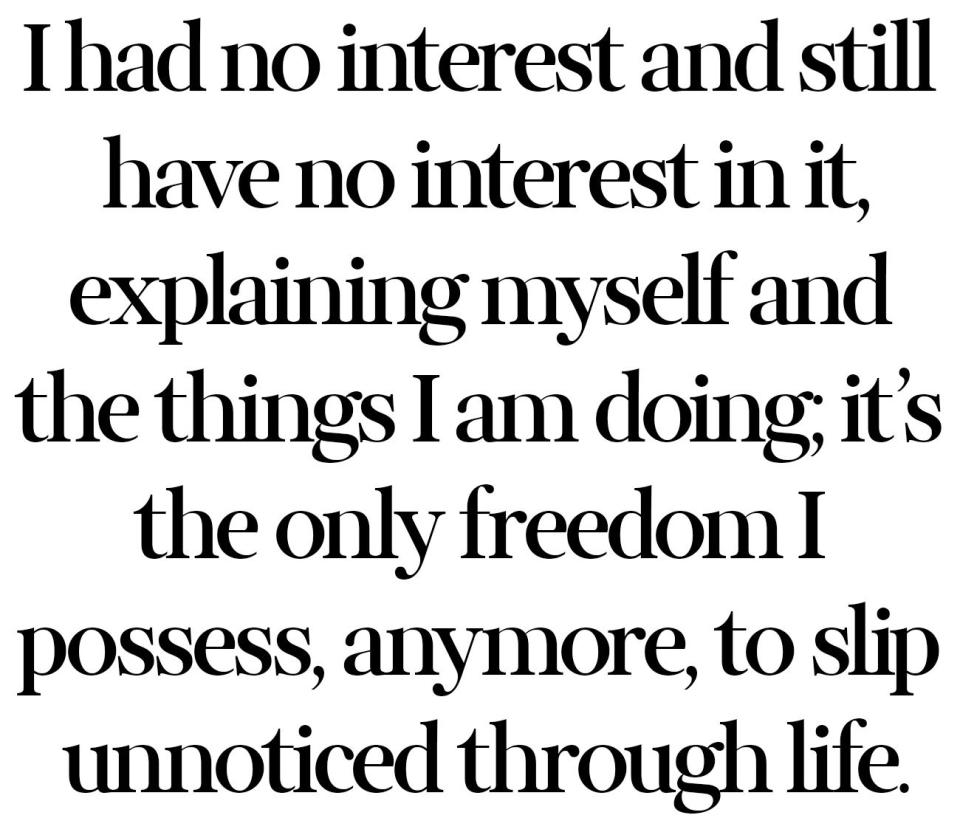
So there, in that museum I had never been to in Texas, I saw the woman I had once known, the sculptor, whose first solo exhibition had been hosted at that museum in Minneapolis years prior, when Philip was still alive, when I was still arguably, possibly, handsome, though I was at this point not so without appeal that I couldn’t meet a twenty-five-year-old poet on an airplane and urinate on his face in the bathroom of a luxury hotel.
I put down my pencil and studied this woman, who was seated at a table, talking seriously to a black man in a gray jacket. He worked at the museum, I understood, and they were discussing the installation of one of her works, which would hang over the stairwell, as good enough a place as any, really. She did not notice me; no one will notice me ever again, I realize. Philip had noticed me, that’s the primary function of love, to notice, to see. Anyway, I was so changed, and she and I knew one another so long ago, what did it matter, really?
I sought the attention of the waitress, who had red hair, in plaits, like a little girl. “I would like to send them a bottle of champagne,” I said, pointing at the artist with whom I had once spent a very cold New Year’s Eve at a house deep in the woods of suburban Maryland.
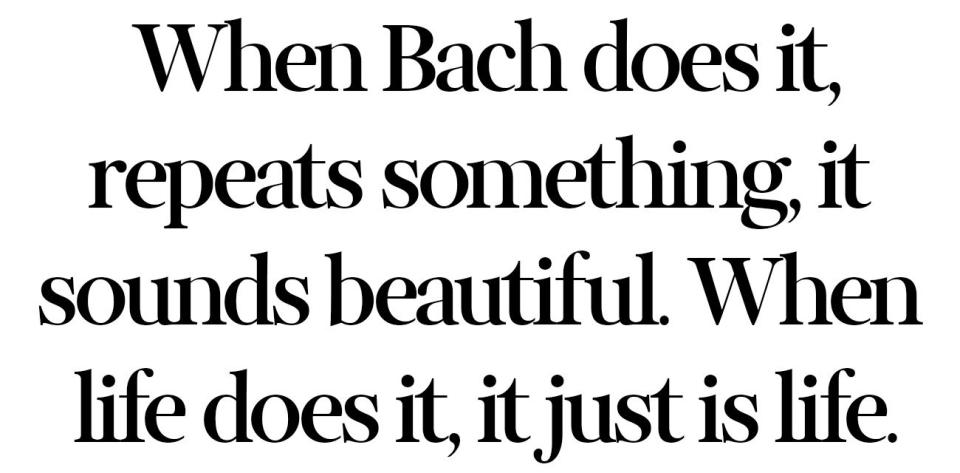
The waitress was exhilarated; this was the kind of conspiracy you hear about but are rarely enlisted into. I gave her my credit card, and asked her to settle the bill before delivering the bottle, allowing me to leave unobserved, without having to make explanations. I had no interest and still have no interest in it, explaining myself and the things I am doing; it’s the only freedom I possess, anymore, to slip unnoticed through life. I wrote a little note, because it would be annoying not to, it would be a story that no one could ever verify, but this would be evidence, like that feeling of the squirrel’s weight on my corduroy pants, which I can, thank you, still remember. What if I tell you that I didn’t know what to say, so I only wrote, “Have one on me,” and signed my name, and hoped that would be enough. There is what we call coincidence, and naming it seems just a concession that we don’t know what to make of it. When Bach does it, repeats something, it sounds beautiful. When life does it, it just is life. When I left the café, left the museum, she was, presumably, receiving my note, and the champagne, and drinking to whatever was in her heart that day, that moment. What if I told you that; it’s quite a story, I think, or maybe the only story I have.
You Might Also Like
